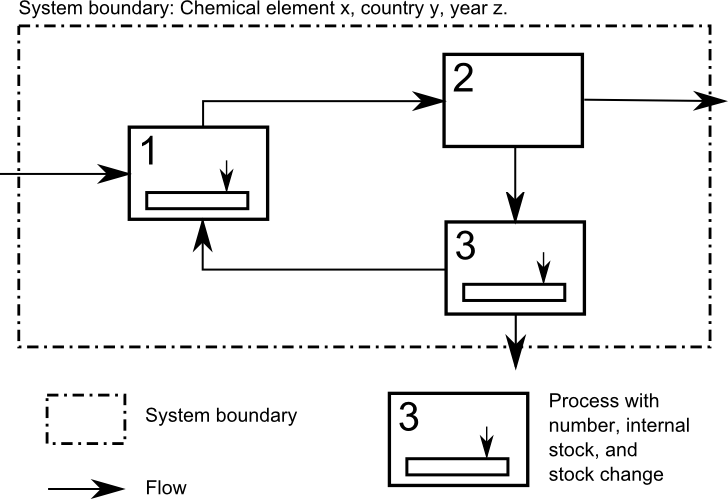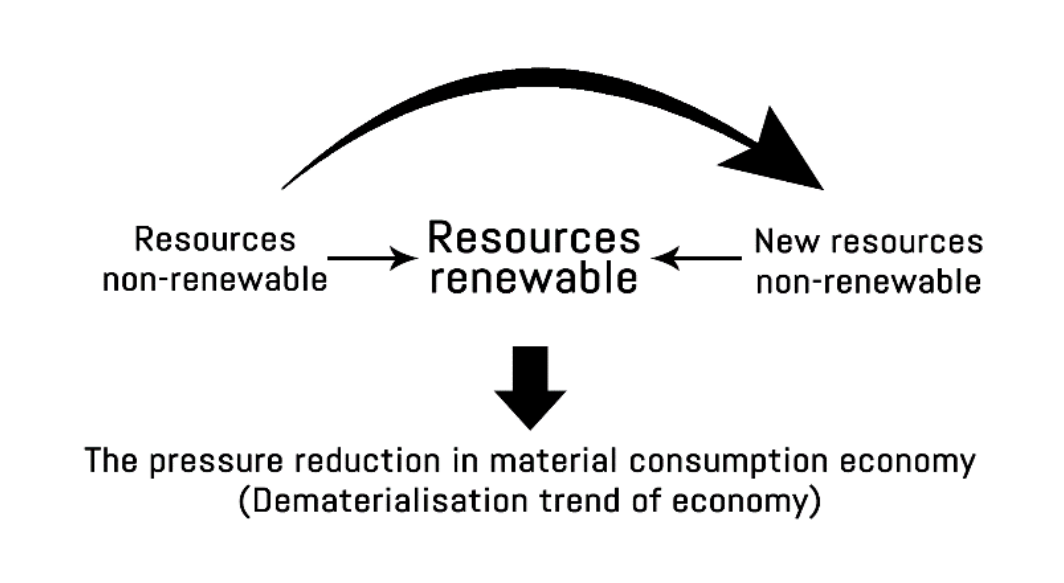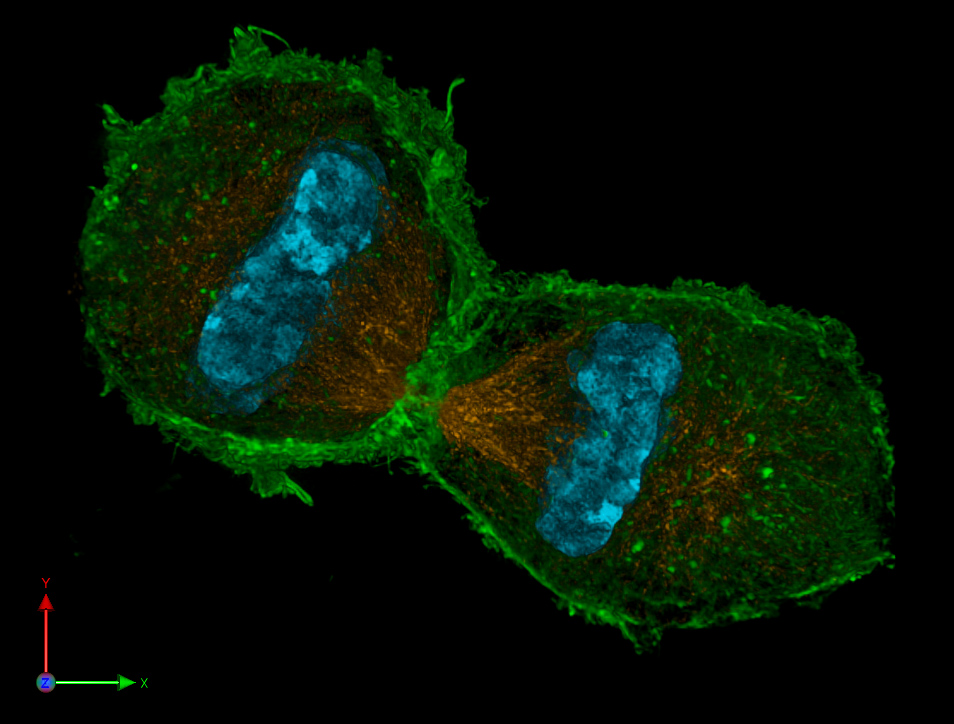|
Industrial Metabolism
Industrial metabolism is a concept to describe the material and energy turnover of industrial systems. It was proposed by Robert Ayres in analogy to the biological metabolism as "the whole integrated collection of physical processes that convert raw materials and energy, plus labour, into finished products and wastes..." In analogy to the biological concept of metabolism, which is used to describe the whole of chemical reactions in, for example, a cell to maintain its functions and reproduce itself, the concept of industrial metabolism describes the chemical reactions, transport processes, and manufacturing activities in industry. Industrial metabolism presupposes a connection between different industrial activities by seeing them as part of a larger system, such as a material cycle or the supply chain of a commodity. System scientists, for example in industrial ecology, use the concept as paradigm to study the flow of materials or energy through the industrial system in order to ... [...More Info...] [...Related Items...] OR: [Wikipedia] [Google] [Baidu] |
Robert Ayres (scientist)
Robert Underwood Ayres (born June 29, 1932) is an American-born physicist and economist. His career has focused on the application of physical ideas, especially the laws of thermodynamics, to economics; a long-standing pioneering interest in material flows and transformations (industrial ecology or industrial metabolism)—a concept which he originated. His most recent work challenges the widely held economic theory of growth. Career Trained as a physicist at the University of Chicago, University of Maryland, and King's College London (PhD in Mathematical Physics), Ayres has dedicated his professional life to advancing the environment, technology and resource end of the sustainability agenda. His major research interests include technological change, environmental economics, "industrial metabolism" and "eco-restructuring". He has worked at the Hudson Institute (1962–67), Resources for the Future Inc (1968) and International Research and Technology Corp (1969–76). From 1979 un ... [...More Info...] [...Related Items...] OR: [Wikipedia] [Google] [Baidu] |
Anthropogenic Metabolism
Anthropogenic metabolism, also referred to as metabolism of the anthroposphere, is a term used in industrial ecology, material flow analysis, and waste management to describe the material and energy turnover of human society. It emerges from the application of systems thinking to the industrial and other man-made activities and it is a central concept of sustainable development. In modern societies, the bulk of anthropogenic (man-made) material flows is related to one of the following activities: sanitation, transportation, habitation, and communication, which were "of little metabolic significance in prehistoric times". Global man-made stocks of steel in buildings, infrastructure, and vehicles, for example, amount to about 25 Gigatonnes (more than three tonnes per person), a figure that is surpassed only by construction materials such as concrete. Sustainable development is closely linked to the design of a sustainable anthropogenic metabolism, which will entail substantial changes i ... [...More Info...] [...Related Items...] OR: [Wikipedia] [Google] [Baidu] |
Urban Metabolism
Urban metabolism is a scientific modelling, model to facilitate the description and analysis of the material flow, flows of the materials and energy transfer, energy within cities, such as undertaken in a material flow analysis of a city. It provides researchers with a metaphorical framework to study the interactions of natural and human systems in specific regions.Pincetl, S., Bunje, P., & Holmes, T. (2012). An expanded urban metabolism method: Toward a systems approach for assessing urban energy processes and causes. Landscape and Urban Planning, 193-202. From the beginning, researchers have tweaked and altered the parameters of the urban metabolism model. C. Kennedy and fellow researchers have produced a clear definition in the 2007 paper ''The Changing Metabolism of Cities'' claiming that urban metabolism is "the sum total of the technical and socio-economic process that occur in cities, resulting in growth, production of energy and elimination of waste."Kennedy, C., Cuddihy, J., ... [...More Info...] [...Related Items...] OR: [Wikipedia] [Google] [Baidu] |
Social Metabolism
Social metabolism or socioeconomic metabolism is the set of flows of materials and energy that occur between nature and society, between different societies, and within societies. These human-controlled material and energy flows are a basic feature of all societies but their magnitude and diversity largely depend on specific cultures, or sociometabolic regimes. El metabolismo social: una nueva teoría socioecológica. Relaciones. 2013. Social or socioeconomic metabolism is also described as "the self-reproduction and evolution of the structures of human ... [...More Info...] [...Related Items...] OR: [Wikipedia] [Google] [Baidu] |
Information Metabolism
Information metabolism, sometimes referred to as informational metabolism or energetic-informational metabolism, is a psychological theory of interaction between biological organisms and their environment, developed by Polish psychiatrist Antoni Kępiński. Overview Kępiński described his psychological theory in several books but the most detailed description is given in his 1974 book ''Melancholy'' (in Polish: "Melancholia"). In order to explain psychological phenomena encountered in humans, he borrowed many concepts from the field of cybernetics which gained popularity in Poland at that time, thanks to the works of Marian Mazur (the father of the Polish school of cybernetics). Kępiński starts with the consideration of most basic organisms and how they are different from inanimate matter. First of all, any organism may be treated as an autonomous but open system, separated from its environment by means of a boundary (skin or cell membrane). As an open system, it is en ... [...More Info...] [...Related Items...] OR: [Wikipedia] [Google] [Baidu] |
Material Flow Analysis
Material flow analysis (MFA), also referred to as substance flow analysis (SFA), is an analytical method to quantify flows and stocks of materials or substances in a well-defined system. MFA is an important tool to study the bio-physical aspects of human activity on different spatial and temporal scales. It is considered a core method of industrial ecology or anthropogenic, urban, social and industrial metabolism. MFA is used to study material, substance, or product flows across different industrial sectors or within ecosystems. MFA can also be applied to a single industrial installation, for example, for tracking nutrient flows through a waste water treatment plant. When combined with an assessment of the costs associated with material flows this business-oriented application of MFA is called material flow cost accounting. MFA is an important tool to study the circular economy and to devise material flow management. Since the 1990s, the number of publications related to mater ... [...More Info...] [...Related Items...] OR: [Wikipedia] [Google] [Baidu] |
Material Flow Accounting
Material flow accounting (MFA) is the study of material flows on a national or regional scale. It is therefore sometimes also referred to as regional, national or economy-wide material flow analysis. Introduction Material flow accounting provides economy-wide data on material use. Through international standardization, this data has become reliable and comparable across countries. Increasingly, the data are also being made available in medium- to long-term time series allowing for the analysis of past trends as well as potential future developments. Material flow accounts provide information on the material inputs into, the changes in material stock within, and the material outputs in the form of exports to other economies or discharges to the environment of an economy. Material flow accounting can be used in national planning, especially for scarce resources, and also allows for forecasting. The method can be used to assess environmental burdens associated with the economic activit ... [...More Info...] [...Related Items...] OR: [Wikipedia] [Google] [Baidu] |
Industrial Ecology
Industrial ecology (IE) is the study of material and energy flows through industrial systems. The global industrial economy can be modelled as a network of industrial processes that extract resources from the Earth and transform those resources into products and services which can be bought and sold to meet the needs of humanity. Industrial ecology seeks to quantify the material flows and document the industrial processes that make modern society function. Industrial ecologists are often concerned with the impacts that industrial activities have on the environment, with use of the planet's supply of natural resources, and with problems of waste disposal. Industrial ecology is a young but growing multidisciplinary field of research which combines aspects of engineering, economics, sociology, toxicology and the natural sciences. Industrial ecology has been defined as a "systems-based, multidisciplinary discourse that seeks to understand emergent behavior of complex integrated ... [...More Info...] [...Related Items...] OR: [Wikipedia] [Google] [Baidu] |
Energy Accounting
Energy accounting is a system used to measure, analyze and report the energy consumption of different activities on a regular basis. This is done to improve energy efficiency, and to monitor the environment impact of energy consumption. Energy management Energy accounting is a system used in energy management systems to measure and analyze energy consumption to improve energy efficiency within an organization. Organisations such as Intel corporation use these systems to track energy usage. Various energy transformations are possible. An energy balance can be used to track energy through a system. This becomes a useful tool for determining resource use and environmental impacts. How much energy is needed at each point in a system is measured, as well as the form of that energy. An accounting system keeps track of energy in, energy out, and non-useful energy versus work done, and transformations within a system. Sometimes, non-useful work is what is often responsible for environm ... [...More Info...] [...Related Items...] OR: [Wikipedia] [Google] [Baidu] |
Dematerialization (economics)
Dematerialization is a social science term which describes the process of making more goods with lesser material required. The term itself possessed multi-accentuality, which allows it to be diversely explained by different fields of social science, such as Mainstream economics, which put focus on the aspect of technological evolution and market demand shifts. At the same time, Ecological economics which emphasise the effect of Dematerialization on the natural environment. In economics, dematerialization refers to the absolute or relative reduction in the quantity of materials required to serve economic functions in society. In common terms, dematerialization means doing more with less. This concept is similar to ephemeralization as proposed by Buckminster Fuller. Origin Dematerialization is a phenomenon occurs simultaneously with technological advancement, especially in the Third Industrial revolution products. Miniaturization and optimization of products are enabled by the ... [...More Info...] [...Related Items...] OR: [Wikipedia] [Google] [Baidu] |
Autopoiesis
The term autopoiesis () refers to a system capable of producing and maintaining itself by creating its own parts. The term was introduced in the 1972 publication '' Autopoiesis and Cognition: The Realization of the Living'' by Chilean biologists Humberto Maturana and Francisco Varela to define the self-maintaining chemistry of living cells. Since then the concept has been also applied to the fields of cognition, systems theory, architecture and sociology. Overview In their 1972 book ''Autopoiesis and Cognition'', Chilean biologists Maturana and Varela described how they invented the word autopoiesis. They explained that, They described the "space defined by an autopoietic system" as "self-contained", a space that "cannot be described by using dimensions that define another space. When we refer to our interactions with a concrete autopoietic system, however, we project this system on the space of our manipulations and make a description of this projection." Meaning Autop ... [...More Info...] [...Related Items...] OR: [Wikipedia] [Google] [Baidu] |
Socio-technological
Sociotechnology (short for "social technology") is the study of processes on the intersection of society and technology. Vojinović and Abbott define it as "the study of processes in which the social and the technical are indivisibly combined". Sociotechnology is an important part of socio-technical design, which is defined as "designing things that participate in complex systems that have both social and technical aspects". The term has been attributed to Mario Bunge. He defines it as a grouping of social engineering and management science. He sees it thus as a form of technology, distinguished from other branches of it such as engineering, biotechnology, information technology and general technology. Its goal is to help engineer sociosystems and evaluate their performance, while making use of social science research. In short, sociotechnology can be seen as the creation, modification and maintenance of social systems. Writing on sociotechnical change, Bijker wrote: "Soc ... [...More Info...] [...Related Items...] OR: [Wikipedia] [Google] [Baidu] |




